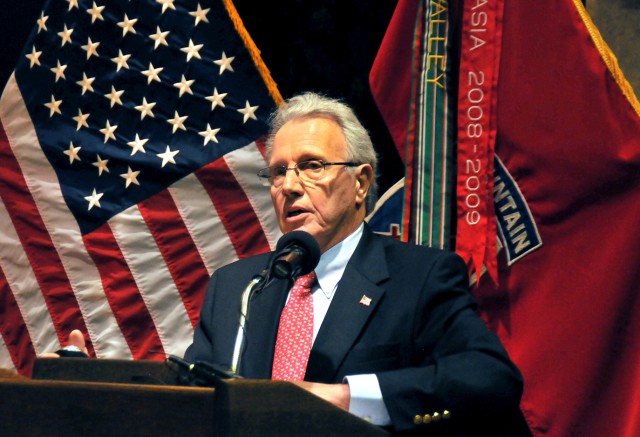FORT DRUM, N.Y. - Less than 48 hours after U.S. forces killed one of the modern world's greatest anti-Semites, a Holocaust survivor visited Fort Drum on Tuesday to recount his family's harrowing experiences in Nazi concentration camps and to praise U.S. Soldiers and their forefathers for combating evil around the world.
"I think the lesson of last week is a good lesson to remember," said Steven Hess, alluding to the death of Osama bin Laden. "Without the men and women of the military, we would always be in danger."
Fort Drum's annual observance of Yom HaShoah, or Holocaust Remembrance Day, centered on "Justice and Accountability in the Face of Genocide: What have we learned'" The theme caused Hess, a 73-year-old lecturer born in Nazi-occupied Holland, to reflect more on the triumphs of Allied Forces during World War II than on justice later served at Nuremberg.
"There is evil in the world," Hess said. "The Nuremburg Trials were important. But thousands and thousands ... of bloodthirsty criminals got off scot-free.
"What have we learned'" he asked. "To me, the lesson is 'train like hell, plan carefully, hit hard and shoot straight.'"
Appeasement never works in battling evil, the U.S. Navy veteran declared.
"People think they can talk themselves out of a situation," he said. "But you can't talk people out of evil. Ultimately, at times, it takes force and the willingness to use it."
He also emphasized how little has changed over the centuries.
"To me, there really is no lesson in all of this," he said. "Anti-Semitism is alive and well in Europe. Israel is constantly under pressure and has very few friends."
Expressing tremendous pride in the bravery and abilities of the U.S. military, he said the role of might in an evil world is sometimes a better instructor than the lessons of history.
As an example, Hess said bin Laden's death will not change anything, but there was a "moment of satisfaction" and "some element of justice."
"God knows what's going to happen tomorrow or the day after," he said. "The base is on a higher alert. Evil is not just going to go away."
Fort Drum's Equal Opportunity Office invited Hess several months ago to be this year's featured guest at Holocaust Remembrance Day - an annual observance in the U.S. and national holiday in Israel. The ceremony began with a chaplain's invocation, followed by the lighting of a seven-stick candelabra. Six of the candles represented six million Jews slaughtered during the Holocaust; the tall center candle symbolized Holocaust sympathizers who stand today against tyranny and oppression.
Hess's address recounted the story of his family's amazing survival in two Nazi concentration camps - Westerbork and Bergen Belsen - from 1942 to 1945.
Born in Holland to German Jews, Hess, along with twin sister, Mary, were two of the very few children to survive the Holocaust. He said his parents escaped to Holland before World War II began because they thought it would be safer. But as it turned out, Holland was the deadliest place for Jews in all of western Europe.
"It's a very small country - flat, no mountains and with no place to hide," he said.
Before Holland joined the war against Germany, Nazis in Holland had the Dutch bureaucracy in their hip pocket, Hess said, leaving Jews "totally exposed."
"The Nazis knew where the Jews lived," he said. "They knew my father owned a Ford."
His family was later rounded up and taken to Westerbork.
"The most horrific thing about Westerbork was the train tracks running through the middle of it," he recalled. "Every Tuesday, an empty train of cattle cars pulled into the middle of camp."
Hess said Nazis packed each cattle car with about 100 Jews, forcing them to stand days on end with no food, water or toilet. Roughly 10 percent of them died en route to four other concentration camps.
"Every person in Westerbork wanted really only one thing: to stay in Westerbork," he said. "These trains went to a totally unknown destination and they came back the following Monday empty, clean and sat there for the next shipment of Jews."
All in all, tens of thousands of Jews at Westerbork boarded trains bound for other concentration camps. More than half of them - about 54,000 - died in Auschwitz. Hess's family was lucky, because Bergen Belsen, where they were shipped, did not yet have gas chambers.
"It was not a killing center," he said. "But it was a very effective death center. Death came through starvation, disease and maltreatment. People died by the hundreds and not the thousands."
Hess said one week before the British liberated Bergen Belsen, the Nazis - knowing time was running out - sought to destroy the remnant of Jews who remained. But during their two-week train ride to an eastern German extermination camp, Hess, his family and 2,000 other Jews on the train were liberated by Allied Forces.
Several weeks later, a long convoy of U.S. military vehicles arrived in the eastern German village to take the exhausted refugees to safety.
"I remember it so well," Hess told audience members. "The Americans had come to take us home. Your grandfathers saved our rears."
After Hess's speech, Brig. Gen. Harry E. Miller Jr., senior commander Fort Drum, presented him with a small gift and told him to please come back and visit again.
"On behalf of the entire team and Family here at Fort Drum, I'd like to thank you for taking the time to be with us here today and for sharing your story of your family's survival and liberation," Miller said. "As Soldiers, this serves as a reminder of what we do to prevent such atrocities like this from ever happening again."


Social Sharing